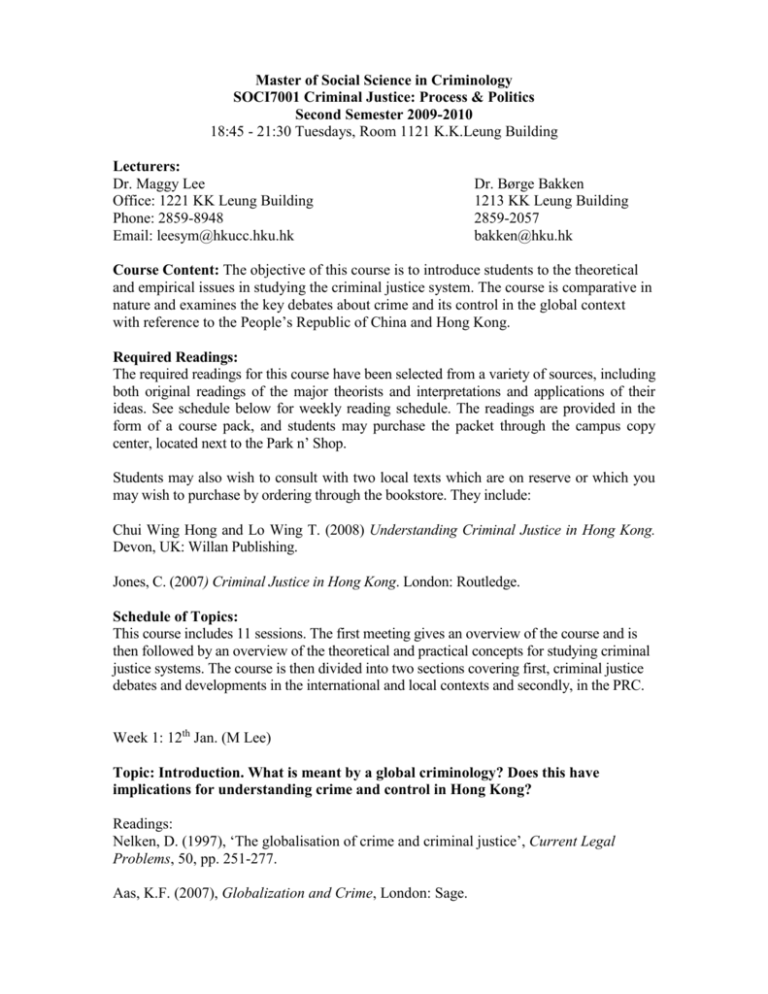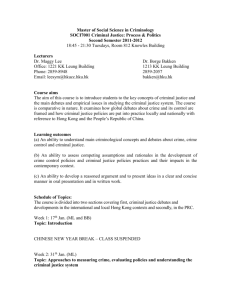
Master of Social Science in Criminology
SOCI7001 Criminal Justice: Process & Politics
Second Semester 2009-2010
18:45 - 21:30 Tuesdays, Room 1121 K.K.Leung Building
Lecturers:
Dr. Maggy Lee
Office: 1221 KK Leung Building
Phone: 2859-8948
Email: leesym@hkucc.hku.hk
Dr. Børge Bakken
1213 KK Leung Building
2859-2057
bakken@hku.hk
Course Content: The objective of this course is to introduce students to the theoretical
and empirical issues in studying the criminal justice system. The course is comparative in
nature and examines the key debates about crime and its control in the global context
with reference to the People’s Republic of China and Hong Kong.
Required Readings:
The required readings for this course have been selected from a variety of sources, including
both original readings of the major theorists and interpretations and applications of their
ideas. See schedule below for weekly reading schedule. The readings are provided in the
form of a course pack, and students may purchase the packet through the campus copy
center, located next to the Park n’ Shop.
Students may also wish to consult with two local texts which are on reserve or which you
may wish to purchase by ordering through the bookstore. They include:
Chui Wing Hong and Lo Wing T. (2008) Understanding Criminal Justice in Hong Kong.
Devon, UK: Willan Publishing.
Jones, C. (2007) Criminal Justice in Hong Kong. London: Routledge.
Schedule of Topics:
This course includes 11 sessions. The first meeting gives an overview of the course and is
then followed by an overview of the theoretical and practical concepts for studying criminal
justice systems. The course is then divided into two sections covering first, criminal justice
debates and developments in the international and local contexts and secondly, in the PRC.
Week 1: 12th Jan. (M Lee)
Topic: Introduction. What is meant by a global criminology? Does this have
implications for understanding crime and control in Hong Kong?
Readings:
Nelken, D. (1997), ‘The globalisation of crime and criminal justice’, Current Legal
Problems, 50, pp. 251-277.
Aas, K.F. (2007), Globalization and Crime, London: Sage.
Week 2: 19th Jan. (M. Lee)
Topic: Overview of concepts and approaches to studying the criminal justice system.
Readings:
Malcolm Davies et al. (2005), Criminal Justice, Harlow: Longman. Chapter 1.
Chan, J. (2005), ‘Globalisation, reflexivity and the practice of criminology’, Sheptycki, J.
and Wardak, A. (2005) (eds), Transnational and Comparative Criminology, pp. 337-355.
Week 3: 26th Jan. (M. Lee)
Topic: From Policing the Colony to Service Quality for “Asia’s World Class City”
Readings:
McLaughlin, E. (2007), The New Policing, London: Sage.
Jones, C. (2007), Criminal Justice in Hong Kong, London: Routledge (Chapter 25).
Jones, T. and Newburn, T. (2002) The Transformation of Policing? British Journal of
Criminology. 42: 129-146.
Week 4: 2nd Feb. (M. Lee)
Topic: Crime Prevention and Routine Activities in Everyday Life
Readings:
Chapters in McLaughlin et al. (eds.) (2003), Criminological Perspectives – Essential
Readings
M. Felson, ‘The routine activity approach as a general crime theory’.
R. Clarke, ‘Situational crime prevention: theory and practice’.
J.Q. Wilson and G. Kelling, ‘Broken windows: the police and neighbourhood
safety’.
Week 5: 9th Feb. (M. Lee)
Topic: Models of Punishment and Corrections
Readings:
Caradino, M. and Dignan, J. (2007), The Penal System: An Introduction. London: Sage
(Chapter 12).
Carrabine, E. et al. (2009), Criminology: A Sociological Introduction. London: Routledge.
2
16th Feb. - Chinese New Year (class suspended)
Week 6: 23rd Feb. (M. Lee)
Topic: The Treatment of Victims in the Criminal Justice System.
Readings:
Goodey, J. (2005), Victims and Victimology, Harlow: Pearson Longman,
Walklate, S. (2007) (ed), Handbook of Victims and Victimology, Cullompton: Willan.
Davies, P., Francis, P. and Jupp, V. (2000), Victimization: Theory, Research and Policy,
London: Macmillan.
Reading Week: Class suspended on 2nd March
Week 7: 9th March (B. Bakken)
Topic: History of Criminal Justice in China
Readings:
K. Mühlhahn (2009), Criminal Justice in China – A History, Cambridge: Harvard
University Press (‘The right degree of pain: Imperial China’ (pp. 14-57).
University holiday (Class suspended on 16th March 2010)
Week 8: 23rd March (B. Bakken)
Topic: Court Theatres: Courts and Law in the People’s Republic of China
Readings:
Yingyi Situ and Weizheng Liu, “The Criminal Justice System in China”, in Obi N.I. Ebbe
(ed.), Comparative & International Criminal Justice Systems: Policing, Judiciary, and
Corrections, 2nd. Edition, Boston, Butterworth–Heinemann, 2000, pp. 129-142
Susan Trevaskes, Courts and Criminal Justice in Contemporary China, Lanham,
Lexington Books 2007, Chapter 2: Courts on Trial pp. 29-59
3
Week 9: 30th March (B. Bakken)
Topic: Street Theatres: Punishment, Criminal Justice, and “People’s Revenge”
Readings:
Børge Bakken, "China. The Punitive Society?" Unpublished manuscript, 2008, (21
pages).
Susan Trevaskes, Courts and Criminal Justice in Contemporary China, Lanham,
Lexington Books 2007, Chapter 3: Expressive Punishment: The Court Sentencing Rally,
pp. 59-79.
Easter (Class suspended on 6th April)
Week 10: 13th Apr. (B. Bakken)
Topic: Contract Policing in the People’s Republic of China
Readings:
Børge Bakken, Policing in Chinese Societies, Hong Kong, Open University, 2005, Unit
3, pp. 17-62
Michael Dutton, Toward a Government of the Contract: Policing in the Era of Reform, in
Børge Bakken (ed.), Crime, Punishment, and Policing in China, Lanham, New York,
2.ed. 2007, pp. 189-235 (excerpts, 19 p.)
Week 11: 20th Apr. (B. Bakken)
Topic: Chinese Prisons and Corrections. Laogai (劳改) and Laojiao (劳教).
Readings:
James D. Seymour, Sizing up China’s Prisons, in Børge Bakken (ed.), Crime,
Punishment, and Policing in China, Lanham, New York, 2.ed. 2007, pp. 141-161
Fu Hualing, "Re-education through Labour in Historical Perspective", The China
Quarterly, Volume 184, December 2005, pp 811-830.
Assessment
Students are required to attend and actively participate in class. As a reminder of the
programme’s policy, if a student should miss a class, it is their responsibility to inform
the teacher (preferably in advance) along with the reason. Students may be required to
produce appropriate documentation. Students who miss more than three classes will be
penalized (this may range from deduction of the overall course grade to not being
4
permitted to take the final examination). The penalty will be determined by a panel of
teachers in the programme and the student may be called upon to appear before the panel.
The final mark for the course is based on coursework (50%) and an examination at the
end of the term (50%). The coursework portion of the grade is based on three elements:
1. Active class participation (not simply attendance) (5%)
2. Portfolio (25%) - Students will keep a portfolio on what they are learning in class
and the readings. Each week, students should write 2-3 pages (about 750 words)
discussing what they learned on that topic for the week. In doing so, the
discussion should integrate the lectures, readings and any class discussion. The
first half of the portfolio will cover weeks 3 to 6 and should be turned in at the
lecture in week 7 (9th March). The second half of the portfolio will cover weeks 8
to 11, and will be due on 27th April. Please be reminded that plagiarism will not
be tolerated and will result in an automatic zero grade AND will be reported to the
University.
3. Group presentation and write up (20%) – Students will be organized into small
groups for the semester. Students should select one of the weekly topics from the
course and will be expected to engage with current debates and examples related
to the criminal justice system locally or in the PRC. The group will be given a
presentation mark (10%) and the write-up should be based on each individual’s
contribution to the group (10%). Time will be allotted during class time for
students to work on their presentation. The presentation schedule will be given out
once all topics are assigned. The write-up will be due two weeks after the
presentation.
5









